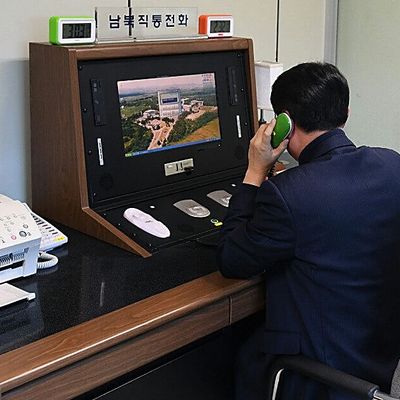
The mixed signals North Korean dictator Kim Jong-un sent in his New Year’s Day address have sparked dramatic developments over the past 48 hours. First, President Trump responded to Kim’s latest provocation — “The entire United States is within range of our nuclear weapons, a nuclear button is always on my desk” — with an appalling threat of his own.
Then, after most Americans headed to bed on Tuesday, with many wondering if the president might drag us into war via tweet, we learned of a major shift in relations between the two Koreas. In his New Year’s speech, Kim extended a rare olive branch to the South, saying they should begin talks “as soon as possible” and “work together as a people of the same heritage to find peace and stability.” At 3 p.m. local time on Wednesday, Kim made good on that pledge, ordering the reopening of a hotline with the South that’s been dormant for almost two years.
“We have received orders to reopen the Panmunjom phone line … to discuss issues including our participation in the Winter Olympics,” said Ri Son-gwon, the head of the North Korean government department that manages its South Korean policy.
South Korea’s Unification Ministry said the two sides were on the phone from 3:30 p.m. to 3:50 p.m. local time. They did not describe exactly what was said, but reported that they “checked technical issues of the communication line.” They said they were awaiting a possible second call from the North, which may pave the way for official talks in the coming days.
North Korea stopped answering the hotline in the border village of Panmunjom, which is in the Demilitarized Zone, in February 2016, when South Korea’s former President Park Geun-hye shut down the Kaesong Industrial Complex, which employed workers from both sides. Park was responding to Kim launching a satellite into space and claiming to have tested a hydrogen bomb. The South kept trying the hotline every day, but the North never picked up.
In the meantime, the North grew increasingly provocative in its pursuit of nuclear weapons, and Trump’s belligerent exchanges with Kim helped raise fears that we’re on the brink of war. In this context, any diplomatic progress may come as a relief, but Kim’s motives remain unclear.
South Korea’s new, liberal president, Moon Jae-in, has gone along with U.S.-led efforts in increase sanctions on North Korea, but he insists that on its own, that strategy won’t make Kim curb his weapons program. “The reopening of a communications channel is highly significant because it is a step toward being able to hold dialogue anytime both sides want,” said Yoon Young-chan, a spokesman for Moon.
But many experts believe Kim’s true aim is to drive a wedge between the U.S. and South Korea by taking advantage of this tactical disagreement. He may think that if he improves relations with his neighbor, Seoul with push the U.S. toward détente. That might also play into the North’s narrative that its nuclear weapons are a necessary defense against U.S. aggression. At the very least, pretending that it wants to negotiate a peaceful resolution may give the North time to perfect its missiles and become an official nuclear-weapons state.
U.S. officials said they’re extremely skeptical of Kim’s overtures, and will not allow him to sour the U.S.–South Korean alliance. Prior to Trump’s tweet, Nikki Haley, the U.S. ambassador to the United Nations, warned that there are reports North Korea may be gearing up for another missile test, even as Kim talks about peace.
“North Korea can talk to anyone they want, but the U.S. is not going to recognize it or acknowledge it until they agree to ban the nuclear weapons that they have,” she said.
Still, some suggested that reestablishing contact between the two Koreas is a step in the right direction, for all involved. “A better North-South relationship would help Washington and the international community to better understand North Korea and to talk it into taking substantive measures of self-restraint,” Tong Zhao, a fellow at the Carnegie-Tsinghua Center for Global Policy in Beijing, told CNN.
It does seem more promising than trying to top whatever crazy thing Kim says, in 240 characters or less.






























